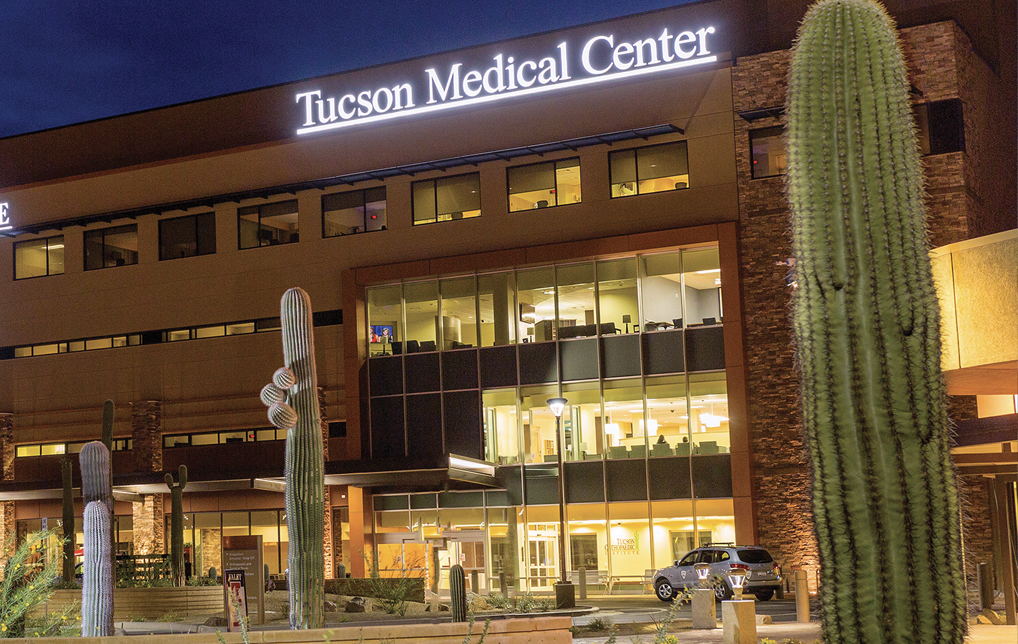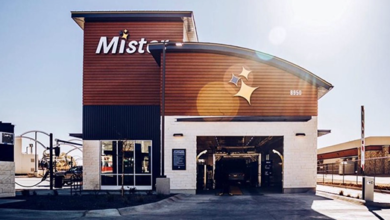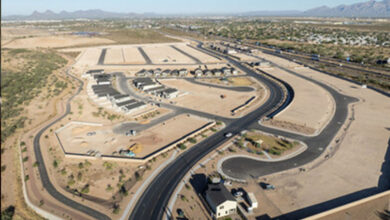
Tucson Medical Center Opens Nation’s Second Monoclonal Antibody Infusion Center
The U.S. Department of Health and Human Services and Tucson Medical Center began administering monoclonal antibody therapeutic treatments this week at a temporary COVID-19 infusion center in Tucson.
The center is the second federally supported infusion center in the country to treat certain COVID-19 patients in order to prevent hospitalization and the severity of illness.
The TMC antibody infusion center will treat patients with mild to moderate symptoms who have tested positive for COVID-19 and are at high risk of severe illness or hospitalization.
Patients at the infusion center will receive one of two monoclonal antibody therapeutics authorized by the U.S. Food and Drug Administration–either one from Eli Lilly and Co., which uses the monoclonal antibody bamlanivimab or one from Regeneron, which combines the two monoclonal antibodies casirivimab and imdevimab.
“Like many areas across the country, Tucson and Pima County are seeing an increase in COVID-19 patients, and many of these patients have become severely ill and need hospitalization,” said Dr. Robert Kadlec, assistant secretary for preparedness and response. “We have deployed a federal medical team to the infusion center to provide the therapeutic treatments which can keep people from becoming so sick that they need to be hospitalized, which will help reduce the stress on the hospital, particularly the ICU, and help save lives.”
“TMC has been on the frontline of this pandemic since the beginning and while we have made great progress in our clinical treatment of patients critically ill with COVID, still too many are dying,” said Judy Rich, president and CEO of TMC HealthCare. “Monoclonal antibody therapeutics give us an early intervention that can keep people out of the hospital and save lives. Between advances in therapeutics and the vaccine, there is good news on the horizon.”
“The pandemic’s impact on our healthcare system demands innovative responses, including ways to employ approved therapeutics to prevent as many severe cases and hospitalizations as possible,” said Dr. Cara Christ, director of the Arizona Department of Health Services. “We’re grateful to the U.S. Department of Health and Human Services and Tucson Medical Center for taking the lead on an effort that holds great promise for our state.”
“Pima County is pleased to work with ASPR, HHS, TMC and AzDHS to help facilitate the availability of monoclonal antibodies for patients with COVID 19 that meet the criteria for this infusion,” said Pima County Health Director Dr. Theresa Cullen. “This partnership helps accelerate access to this therapeutic modality. This should result in decreased hospitalization rates at a time when Pima County is experiencing significantly decreased ICU bed availability.”
The medicines are administered through an intravenous infusion treatment. The infusion of the therapeutic and medical observation together take about two-and-a-half hours. At TMC, patients who meet the criteria will be treated with the therapeutic by a team of medical professionals from the National Disaster Medical System.
Both products can be used to treat adults and pediatric patients (12 years of age and older weighing at least 40 kg/88 lbs) who have positive results of direct SARS-CoV-2 viral testing, and who are at high risk for progressing to severe COVID-19 and/or hospitalization.
High risk adults meet at least one of the following criteria:
- Have a body mass index (BMI) of 35 or greater;
- Have chronic kidney disease;
- Have diabetes;
- Have immunosuppressive disease;
- Are currently receiving immunosuppressive treatment;
- Are 65 years of age or older.
The FDA defines high risk differently for children; that definition is available on the FDA website. Patients who test positive for COVID-19 and meet the criteria can be referred by their medical provider to receive the infusion treatment. In Tucson, patients who have a positive COVID-19 test and are referred by their doctor or who receive a positive COVID-19 test at the TMC emergency department can be referred to the infusion center to receive the treatment within 10 days of testing positive.
Monoclonal antibody treatments have been shown to decrease hospitalization rates in people at highest risk for severe disease from COVID-19. This therapy requires an infusion within the first 10 days after diagnosis, which may require healthcare systems to create new clinical pathways to administer the medicine to patients at the highest risk of developing severe cases of COVID-19.
In November, the FDA issued emergency use authorizations to permit the emergency use of two monoclonal antibody therapeutics to treat mild to moderate COVID-19 in non-hospitalized patients: bamlanivimab from Eli Lilly and Co. was authorized for emergency use on Nov. 9, and Regeneron’s therapeutic was authorized on Nov. 21.
Working with the Department of Defense, HHS is partnering with multiple companies to develop, manufacture and make available therapies to treat COVID-19. To learn more about the monoclonal antibody therapeutic treatments ASPR has purchased and currently is allocating nationwide, visit phe.gov.





